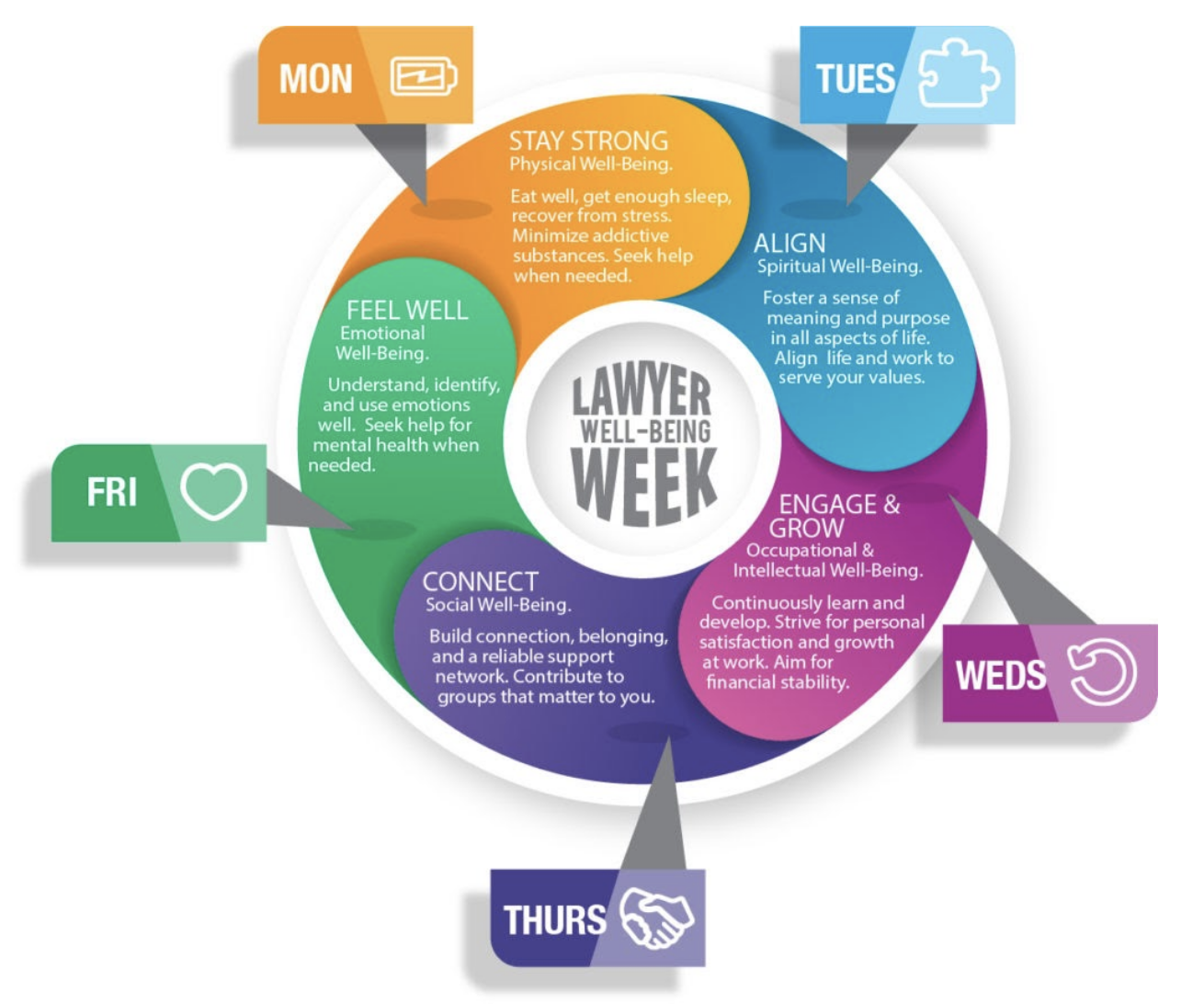
“People who learn to control inner experience will be able to determine the quality of their lives, which is as close as any of us can come to being happy.” - Mihaly Csikszentmihalyi
May is Mental Health Month, a perfect opportunity to provide information to members of the legal community members about the valuable and confidential services that Lawyer Assistance Programs (LAP) and Lawyer Assistance Committees (LAC) provide to judges, lawyers, law students and their immediate family members. This information is especially important as we enter the third month of physical isolation resulting from the COVID-19 pandemic.
Without warning, our lives have been turned upside down. We have had to create ways to work productively at home while balancing our professional and personal duties with the needs of our families, partners, and clients. This is no easy task, especially when many of us are learning new ways of communicating online via Zoom and other video platforms. By now, COVID-19 has touched all aspects of our lives.
Some stress, anxiety and sadness are normal. It is difficult to keep abreast of important and relevant news without feeling overwhelmed. We are looking for answers that are hard to find or do not presently exist. There is uncertainty about the short, medium and long term impact of this experience on all of our lives. We are unsure of when we will resume our “normal” activities, to what degree, and how to stay safe once we do.
Lawyers have higher rates of problematic drinking, depression and suicide than most other professions and significantly higher than the general population. Physical isolation and fears related to the COVID-19 pandemic can exacerbate these problems. Drinking alcohol, overeating, online gambling and other compulsive behaviors can provide immediate and temporary relief but can go from manageable to unmanageable very quickly.
Take the time to ask yourself if you are experiencing any or all of the following:
- Difficulty sleeping, concentrating or making decisions
- Feeling especially fatigued
- Over or under eating
- Difficulty controlling anxious or fearful thoughts
- Irritability and lack of patience
- Engaging in unhealthy behaviors such as excessive drinking, eating, gambling or other compulsive behaviors
If you find that you are having difficulty managing your thoughts or you are concerned about the amount that you are drinking, eating or engaging in other compulsive behaviors, you may have a problem for which there is help.
The Lawyer Assistance Program provides free counseling sessions via a confidential, HIPAA compliant online tele-health platform. Lawyer Assistance Committees provide peer support. YOU ARE NOT ALONE!
Here are 10 tips to help us manage our stress and stay sane during this time. An article, if not a book, could be written on each tip.
- Create a Space to Do Work and a Space to Relax
If possible, these spaces should be separate. This helps us to separate from work and separate from family. It is helpful to have a place that you can “get away” to from work. It doesn’t have to be a big space, just a place that you can go to get away from work, family, expectations. A place to regroup, breath and “reset”. We are likely to be checking emails and returning calls during our supposed down time or family time if we don’t have a separate place for work.
- Manage Expectations of Ourselves and of Others
Lawyers tend to be overachievers; they are who people go to for advice and for answers. It can be difficult in times like this to accept that our expectations may be too high—of others and ourselves. Having reasonable expectations will increase the likelihood that you will be able to stay the course and maintain a healthy and productive mindset. This is a time when we need more from others who are able to give less.
- Create a Routine You Can Keep
It doesn’t have to be the same routine as it was before the quarantine. It is more important that the routine be one that you can stick to. Some people will start work later and end later while others may start and end earlier. It may be that some take breaks in the middle of the day. Get dressed each morning; it will put you in the frame of mind to work.
- Set Boundaries
Limit how often you check your emails to two or three times a day and let clients know this. This helps them have realistic expectations of you that can be sustained. Limit social media use to 30 minutes per day. Monitor your screen time. We all need a break from external stimulation. Turn off notifications during your breaks.
- Practice Tolerating Uncertainty
Part of what makes this pandemic so scary is that there is so much we don’t know and the information and recommendations are evolving in real time. We are learning as we go. One of the best ways to deal with uncertainty is to accept it. Feel your anxiety, don’t run to an unhealthy escape, acknowledge the situation and remember that we have been through difficult times before and have gotten through it! We are more resilient than we give ourselves credit for.
- Strengthen Self Care
Self-care is very important during this time. Eat as many nutritious foods as possible. Use moderation with junk food. Exercise for 15-30 minutes a day if possible. Getting outside to walk is also great! There are a lot of opportunities for online classes now as well. In addition, try to get 6-8 hours of uninterrupted sleep. Take breaks for meditation or relaxing. Give yourself permission to take time for yourself. The next urgent task will be there whether you take that time to meditate or walk, the difference is you will be in a better frame of mind to handle it. Quantity of work does not equate to quality of work. If you don’t make time for yourself, then others are running your agenda and burnout is more likely…especially under these conditions.
- Reach Out to Others
This is really more of a physical isolation than a social isolation. We can still socialize. Modern technology allows us to interact in real time via video platforms like FaceTime, Zoom, Skype, Google Duo and many more. Be creative. People are having scheduled family calls, games and meals online together. NCBA committee meetings are also meeting on Zoom.
- Be of Service to Others
Being of service to others take focus away from the self and increases self-esteem. Scientific studies have shown we experience a decrease in stress, anxiety and depression after helping others.
- Do Something That You Enjoy
Jigsaw puzzles, gardening and models are popular for this or just getting lost in a good series or movie. Many people are rediscovering a joy of cooking and baking while they are home. There are tours of National Parks, museums, Broadway shows and much more.
- Gratitude List
Make a gratitude list every day. Taking 5 minutes at the start of every day to list the important things in your life you are grateful for helps to start the day on an emotionally healthy note. Stop and take a few minutes to inventory how you are feeling before running to the next task.
In addition to the services LAP is offering during this pandemic, LAP continues to provide confidential help to the legal profession addressing a wide range of problems including, alcohol and substance abuse; depression; stress and anxiety; other addictive behaviors such as gambling and eating disorders; compassion fatigue and vicarious trauma; ADD/ADHD; burnout; and anger management.
LAP provides outreach and education to law firms, legal departments, judges, and law schools to recognize symptoms of substance abuse and mental health problems, including suicide prevention and intervention. LAP presentations can be tailored specifically to managing officers, partners, and human resources to: discuss how LAP services assist in the early identification and treatment of afflicted attorneys; create strategies to improve lawyer well being based upon recommendations for legal employers by the National Task Force on Lawyer Well-Being; and review the Model Policy for Law Firms addressing Impairment which was developed by the NYSBA LAP.
LAP services include:
- Comprehensive assessment and evaluation
- Crisis intervention
- Treatment planning
- Professional and peer supportive counseling
- Case management
- Monitoring: LAP’s Monitoring Program assists law school students, bar applicants, practicing attorneys, and suspended and disbarred attorneys seeking reinstatement to establish a history of rehabilitation and recovery.
- Referrals to expert treatment programs and professionals.
- Consultation to legal employers.
- Education and training to the bar and bench.
This crisis will end. We will eventually resume our lives with a new gratitude for all that we once took for granted, however some will still be struggling. Many attorneys will have lost jobs and lost clients, while others will be struggling to rebuild their practices. Law students set to graduate will be navigating uncertain futures. In addition to providing professional and peer support, the Lawyer Assistance Program will be here to help them make that transition. The LAP will be restarting its Un/Under Employment Support Group to assist attorneys who are struggling to find work, rebuild their practices, and network with other attorneys.
There is no shame in having a problem, but remember that there are ways to get help as well. Please reach out to your local bar association for more information. All communication with LAP and Lawyer Assistance Committee members is strictly confidential pursuant to Judiciary Law Section 499.
In New York, contact the New York State Bar Association, Lawyer’s Assistance Program.
In New Jersey, contact the New Jersey State Bar Association, Lawyer’s Assistance Program.


